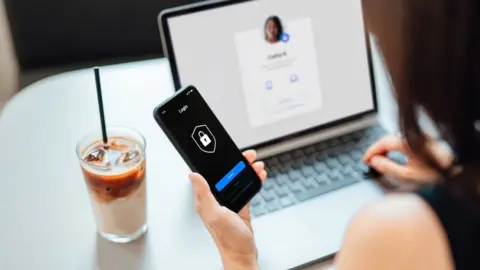Huge rise in LinkedIn bogus boss scams - Warwickshire Police
 Getty Images
Getty ImagesFraudsters are targeting young professionals using their LinkedIn profiles, police are warning.
One scam known as "bogus boss" involves workers receiving fake emails purporting to be from their employer.
The website is being "massively exploited by criminals in terms of being able to scrape information", said Warwickshire Police.
Cyber protect officer James Squire said it was one of the fastest growing scams the force was seeing.
One victim, in his 20s, told BBC CWR he had lost almost £1,000 after responding to fake emails and texts from someone he believed to be his boss.
"I'd started a new job so I was really keen to impress," he said, when he received the message asking him to purchase vouchers on behalf of the company.
"It's a really small company and it wasn't out of the ordinary for him to be in touch with me," he explained.
"At first they asked me to purchase £300 of vouchers and then once I'd agreed they asked me to buy more and more of them.
"I showed a couple of my colleagues, and they seemed to think it was normal so I did it."
 Getty Images
Getty ImagesHe explained it wasn't until after the purchase had gone through he realised the email address was fake.
He said he had been unable to get a refund from his bank's fraud department "because they were considered purchases that I had made".
"My colleagues and I go through online safety training, but I still don't know how these people got hold of my work email address and phone number," he added.
The "incredibly convincing" scam is one of the most common tactics criminals are using at the moment, said PCSO Squire.
The website is "great for business," he added but allowed the criminals access to information that make the fake emails seem "more plausible and believable".
"Unfortunately for us everybody has got an email address and phone number in order to do pretty much anything at the moment, so unfortunately criminals are able to exploit that from anywhere in the world.
"The criminals are relying on us to be click-happy, be that a link in an email or text message, so take five seconds or five minutes to think what you're clicking on," he added.
A LinkedIn spokesperson said: "While we don't have evidence that this fraudulent activity took place on LinkedIn, we were saddened to hear what had happened.
"We recommend a number of ways our members can protect themselves from potential scams.
"It's important to only connect with people you know and we strongly advise against sharing personal information in messages or clicking on links from people you don't know.
"We encourage anyone who sees signs of potential fraud to report it to us so we can take action."

Follow BBC West Midlands on Facebook, Twitter and Instagram. Send your story ideas to: [email protected]
